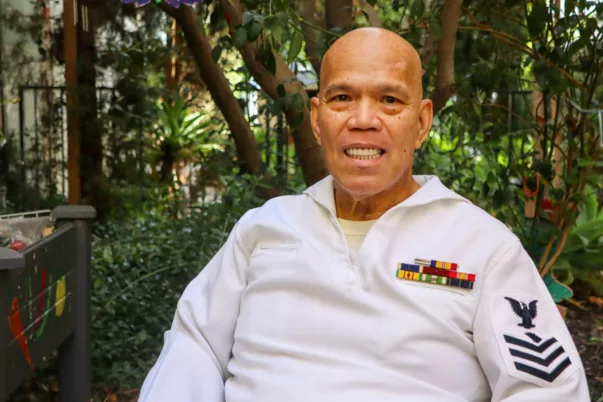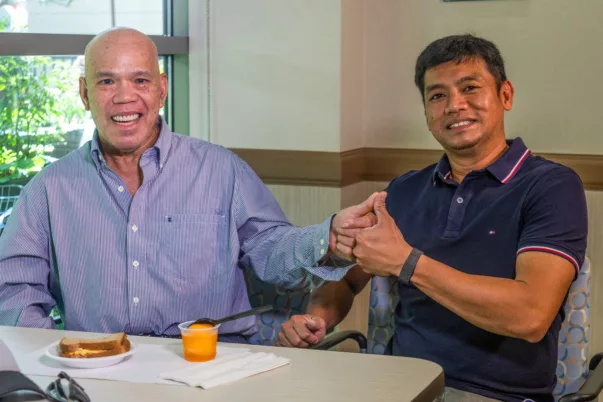When It Comes to Providing Expert Care for Veterans, Los Angeles Jewish Health Is Proud to Serve


When It Comes to Providing Expert Care for Veterans, Los Angeles Jewish Health Is Proud to Serve
In December 2022, when Navy veteran Ed Vibar, 72, first came to Los Angeles Jewish Health’s Brandman Centers for Senior Care (BCSC), a Program of All-inclusive Care for the Elderly (PACE), he rolled his wheelchair through the doors. Ed had been unable to walk for four years, following an ankle injury. He had begun to lose hope that he would ever recover his mobility and had turned to LA Jewish Health and BCSC PACE as a last resort.
For Ed, the road to Los Angeles Jewish Health had been a winding one. He immigrated to the United States from the Philippines as a young man and enlisted to serve his adopted country, spending 12 years on active duty and another five in the Naval Reserve. He loved his work, which included stints on a guided missile destroyer in Vietnam and a project management position that had him collaborating with the Army Corps of Engineers to oversee a $300 million budget. During the course of his career, Ed was married three times and had four children, bringing him the attendant joys and heartaches that can accompany domestic life.

Retirement brought an end to Ed’s health insurance, so when he injured his ankle in his late 60s, he sought care at his local Veteran’s Affairs Hospital. Though imaging showed damage to nerve tissue and tendons, at that time Ed was told the VA lacked the resources to provide appropriate therapy, and doctors informed him he was unlikely to recover the ability to walk. Meanwhile, the longer he remained confined to a wheelchair, the more his health declined, and he began to suffer from gout, high blood pressure, and depression. Being unable to drive made it hard to buy groceries and cook nutritious meals, and eventually, he lost all his teeth.
When he saw a brochure for BCSC PACE, Ed decided to investigate. “I went online and realized BCSC PACE was exactly what I needed,” he recalls. “In addition to offering state-of-the-art physical therapy, they would also coordinate all of my care and provide transportation, which was becoming increasingly difficult for me to access. And the costs were all taken care of thanks to my Medicare and Medi-Cal coverage!”
At BCSC PACE, Ed was paired up with Jensen De La Luna, an expert physical therapist who went to work creating a rigorous treatment plan. “Ed was clearly depressed, and initially, his drive to get better was fairly low. But we dove into therapy twice each week, and his motivation picked up. After three months, he started walking again,” Jensen says.
For Ed, being able to get up and around with a walker was transformational. “Jensen inspired me to try, which really gave me a boost,” he says. “I kept thinking, if I work a little harder, I can travel to see my grandchildren.”
Soon, he was able to stand on his feet to cook, do dishes, and clean up after his dog. “It really changed my life, and I did end up taking the train to Texas, all on my own, to see my grandkids,” he says. “I owe it all to LA Jewish Health’s BCSC PACE program!”
Today, Jensen says Ed’s mobility has increased by more than 50 percent – and his pain has decreased by an equal amount. “I’m so happy for him,” Jensen says. “It’s amazing to see that someone who used to require a wheelchair to come see me can now walk right through the door!”
In addition to physical therapy, Ed also received occupational therapy (to help improve his performance of daily tasks) at the BCSC PACE program – and he had a team of professionals helping meet his other medical issues, as well. “I didn’t have proper teeth, and BCSC PACE got full dentures for me right away. Now, I can eat everything, including a full steak dinner. They were so amazing at anticipating my needs,” he says. “I used to be afraid to smile, but now I want to open my mouth wide and say, ‘Come to the BCSC PACE program and Los Angeles Jewish Health!’ I would recommend it to any veterans, and to all seniors who want to get better healthcare and improve their life situation.”
The Brandman Centers for Senior Care’s PACE program continues to expand to meet the needs of the community. The newest site – on Pico Boulevard, in West Los Angeles – is scheduled to open this November. For more information call (818) 774-8444 or go to BrandmanSeniorCare.org.
